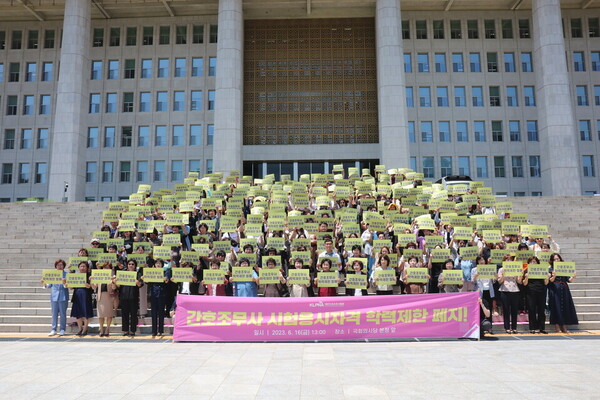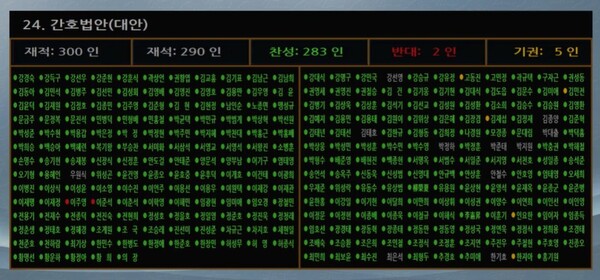The “Nursing Act” has passed the National Assembly plenary session with near-unanimous consensus, but backlash remains. Following a petition calling for its abolition, nursing assistants are also reacting against its “rushed passage.”
Notably, nursing assistants argue that the nursing law should be amended to include a provision to abolish the educational qualification standard for taking the nursing assistant exam, which is excluded from the law.

“The National Assembly has turned a blind eye and betrayed 900,000 nursing assistants. We are outraged by the ruling and opposition party lawmakers who emphasized only nurses and ignored nursing assistants,” the Korean Licensed Practical Nurses Association said in a statement on Wednesday. “We reject the unconstitutional nursing law that excludes nursing assistants.”
“Nursing assistants who expected the social stigma and discrimination of 'high school graduates' to be eliminated are filled with despair and anger,” the association said. “We can never agree to a nursing law that discharges nursing assistants. We firmly oppose the nursing law, whose unconstitutionality has not been resolved, as the educational requirements to take the exam remain unchanged.”
Following the passage of the Nursing Act, a petition was also posted calling for its abolition of the Nursing Act. The opponents expressed concerns that the nursing law will accelerate the medical chaos on the verge of collapse due to the government's push to increase the number of medical students.
The petition to abolish the nursing law, raised by the union of medical students’ parents, was posted immediately after the Health and Welfare Committee passed the bill on Tuesday and had 15,847 signatures as of 5:40 p.m. on Wednesday.
“It is contradictory to restrict the practice of doctors with six years of training through a practice license while allowing nurses to delegate broad diagnostic and treatment powers,” the petitioners wrote. “Nurses should remain under the Medical Service Act. There is no reason for another set of laws to exist for nurses.”
“If the Nursing Act allows nurses to provide comprehensive diagnosis and treatment, it is questionable how it is different from the work of a medical doctor,” the petition said. “Instead, the government and the National Assembly should focus on recruiting trainee doctors and trying to produce specialists every year.”
Nursing Act passes Assembly plenary session nearly unanimously

On Wednesday, the National Assembly’s plenary session approved the Nursing Act, which calls for legalizing PA (physician assistant) nurses. It comes more than a year after it was scrapped by President Yoon Suk Yeol's veto last year.
Of the 290 lawmakers present, 283 voted in favor. Two lawmakers voted against the bill, and five abstained.
Reps. Lee Joo-young and Lee Jun-seok of the Reform Party were the only lawmakers to vote against the Nursing Act. Rep. Lee Ju-young is a former physician who has opposed the nursing law. The five abstentions came from the ruling People Power Party, including physician-turned-lawmakers Han Ji-a and Ihn Yo-han.
“The nursing law, which President Yoon vetoed, was only passed today with a consensus of ruling and opposition parties,” said Rep. Kang Sun-woo of the opposition Democratic Party of Korea, a Health and Welfare Committee member, during the plenary session. “However, the Nursing Act is not a bill to repair the healthcare void caused by the medical crisis.”
The Nursing Act systematically regulates matters related to the licensure and qualifications of nurses, the scope of work, rights and responsibilities, supply and education, and the improvement of nursing policies for long-term service. It also specifies the basis for performing the work of physician assistants (PAs) in the law and includes requirements and procedural regulations for performing the work.
As the legal basis for PA work has been established, the Ministry of Health and Welfare plans to establish a PA nurse education, management, and operation system. The ministry will also set up a comprehensive nursing plan every five years and operate a nursing policy review committee to deliberate on improving the training and treatment of nursing personnel.
The Nursing Act will take effect nine months after its promulgation.

